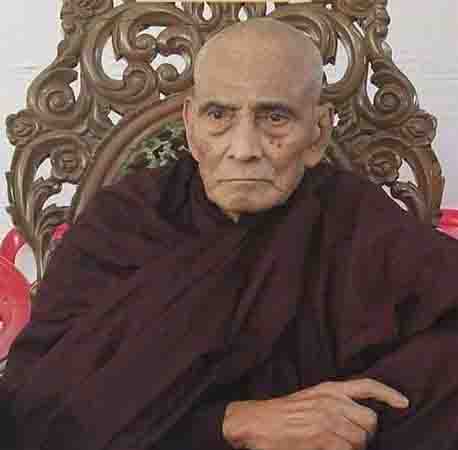
On
behalf of Moanoghar we accord our warm congratulations to Ven. Jnanashree
Mahathera, the key founder of Moanoghar on his being awarded with the Ekushey
Padak 2022. On 3 February the Ministry of Cultural Affairs announced the list
of the Ekushey Padak 2022 winners. 24 distinguished persons have been awarded
this year in recognition of their contributions in different field. Ven.
Jnanashree Mahathera has been awarded in the category of social service.
The Ekushey Padak is the second highest civilian award
in Bangladesh. The Award consists of a gold medal weighing
35 grams, Tk. 400,000 and a certificate. The Prime Minister will present the
awards through an event.
We,
the Moanoghar family members are very happy with this state recognition for the works
and contribution of Ven. Jnanashree Mahathera to the selfless service to the
thousands of orphans and destitute children in the Chittagong Hill Tracts and
beyond.
It is worthwhile to mention here that Ven. Jnanashree
Mahathera is a pioneer to apply the Buddhist values and principles in social
works in the greater Chittagong Hill Tracts (CHT). He first established an
orphanage named Parbattya Chattal Boudha Anath Ashram at Boalkhali in Dighinala
in 1961 in order for imparting shelter and education to the orphans. Later in
1974 Moanoghar was established at Rangapani village in Rangamati under his
direct guidance and financial support from him. During the conflict period in
the CHT, Parbattya Chattal Boudha Anath Ashram (PCBAA) was destroyed. However,
Moanoghar has remained fully functioning until today. For its contribution in
spreading the light of education, Moanoghar is now recognised as a ‘light
house’ in the hills.
Beyond the hills, Ven. Jnanashree Mahathera
established many educational institutions such as in Chittagong, Joypurhat and
Rangpur.
Ven. Jnanashree Mahathera came to Chittagong Hill
Tracts in 1958 as a Head Priest at Mubachari Buddhist Vihara in Mahalchari. After
two years, that Buddhist Vihara was submerged in the water when the Kaptai Dam
was completed. Then Ven. Jnanashree Mahathera moved to Boalkhali Deshabala Raj
Buddhist Vihara in Dighinala.
In the wake of the Kaptai Dam, Ven. Jnanashree
Mahathera witnessed the social turmoil and sufferings of the hill people. He
was moved by the unbearable brunt of the Kaptai Dam inflicted on the mass
people therein. Alongside these sufferings caused by the Kaptai Dam, he
witnessed the social vices, uncertainties in lives and livelihood, and lack of
education and other social services. He himself being an orphan in his early
life, he was moved by the sufferings of the orphaned and destitute children in
the locality.
Under these circumstances, despite his being a
Buddhist monk, he could not keep himself aside from the social reality. He
engaged himself in the social work being inspired by the motto of “for the
wellbeing of the many, for the happiness of the many” as taught by the Buddha
to his disciples. He translated the principles of metta-karuna-mudita (loving
kindness-compassion-emphatic sympathy) into his social actions. In this regard,
he started to work on providing education as a means of removing illiteracy, poverty,
superstitious beliefs and other social evils from the society. For moral
education, he established Pali Tolls and Colleges alongside the educational
institutions for general education. He allowed the Sramanas (novices) and
bhikkhus (monks) to receive general education from general educational
institutions. Notable that during that time, there was a common view among the
Buddhist communities that the Sramanas and Bhikkhus to should not receive general
education from the lay educational institutions. Ven. Jnanashree Mahathera
challenged this social perception. He encouraged Sramanas and Bhikkhus to
receive both moral and general education.
Thanks to his
farsightedness and pragmatic social engagement, we have got many educational
institutions such as PCBAA and Moanoghar. As a social engagement Guru Ven. Jnanashree
Mahathera he trained up his disciples and motivated them into social
engagement. Among his luminous disciples some names are worthy to mention here
such as Ven. Bimal Tissya Mahathera, Ven. Prajnananda Mahethera and Ven.
Shraddhalankar Mahathera, who have been playing revolutionary roles to spread
education in the hills and beyond.
As a practice of his
social intervention, Ven. Jnanashree Mahathera mobilized the neighbouring families
of his Bouddha Vihara to save ‘handful rice’ (moosti chal) which was utilized to establish a school and to feed
the orphans sheltered at the Buddhist Vihara. Alongside, he motivated the well
off families to donate rice and the Bhikkhu Sangha to make donations for this
purpose. Savings of moosti chal was
instrumental to shaping the idea of Moanoghar and its mother institution – PCBAA.
Ven. Jnanashree Mathera sowed the seed of
social engagement through setting up PCBAA in 1961. Now we can see the results
of his action. Thousands of orphans and marginalised children received
education from Moanoghar and other educational institutions. Many of them are
doing jobs in different government and non-government agencies at home and
abroad. They have been playing important roles for the development of society and the
country on the whole. The educational institutions set up by him are providing
education to hundreds of hundred children.
This noble work and
contribution made by the most Ven. Jnanashree Mahathera has been recognised by
the state through award of the Ekushey Padak 2022. We are very proud of him.
We, on behalf of
Moanoghar, share our happiness with him and all on this grand moment.
May the most Ven.
Jnanashree Mahathera long live among us, and bless us to keep on our mission “for the wellbeing of the many, for the
happiness of the many”.